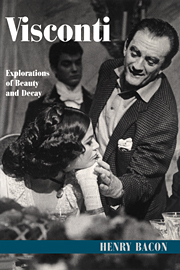4 - VISCONTI AND GERMANY
Published online by Cambridge University Press: 05 June 2012
Summary
VISCONTI, THOMAS MANN, AND TWO ASPECTS OF EUROPE
Visconti liked to boast about his connection with German culture by claiming that he had partly German ancestry – after all, the Viscontis of the Middle Ages had been Langobards. But though Germany always fascinated him, in his youth he was drawn more to France. His life in Paris in the thirties had had a decisive influence on his development both as a person and an artist. Yet of all his films only The Stranger is based on a French subject. In contrast, three consecutive films were not only set in Germany but were also closely tied to the history and culture of that country – these films have often been called Visconti's German trilogy. The connection with Germany is also a significant factor in the episode film The Job.
To Visconti Germany meant above all culture: the works of Goethe, Thomas and Heinrich Mann, and Richard Wagner; also the Austrian variety of German culture – Gustav Mahler and the evocations of the dying Austro-Hungarian Empire by Franz Werfel, Stefan Zweig, and Robert Musil. Reading Karl Krauss and Joseph Roth probably helped give an edge to this nostalgia. But like a shadow behind this interest in German culture was Visconti's fascination with its negation, its plunge into ruthless barbarism. After seizing power in 1933, the Nazis began introducing a new order of their own making. Visconti decided to go and see what was happening with his own eyes.
- Type
- Chapter
- Information
- ViscontiExplorations of Beauty and Decay, pp. 139 - 187Publisher: Cambridge University PressPrint publication year: 1998

